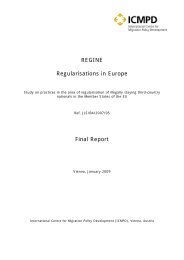taxud/2414/08 - European Commission - Europa
taxud/2414/08 - European Commission - Europa
taxud/2414/08 - European Commission - Europa
Create successful ePaper yourself
Turn your PDF publications into a flip-book with our unique Google optimized e-Paper software.
(b)<br />
the activity may result in the creation, continuation, alteration or extinction of<br />
parties' rights and obligations in respect of an exempt insurance or financial<br />
service;<br />
The second positive criterion is to verify whether the services may create, continue, alter<br />
or extinguish parties' rights and obligations in respect of an exempt insurance or financial<br />
service; where this can be established, the services qualifies as exempt intermediation.<br />
These are services which have a direct impact on rights and obligations of parties and<br />
establish a causal link, because without that intermediation these changes in the financial<br />
situation would not have taken place. The same principles apply where intermediation<br />
leads to the client abandoning his withdrawal from a contract and him continuing his<br />
contract. In fact, in modern intermediation, the activities for accompanying clients in<br />
continuing their contracts have even become more important than intermediation for the<br />
conclusion of contracts; where this cannot be established the next criterion must be<br />
verified<br />
(c)<br />
the activity consists in the provision of advice which reflects specialised<br />
knowledge regarding an exempt insurance or financial service.<br />
This criterion verifies whether the service provided contains a certain level of advice<br />
reflecting a superior know-how of the mediator; where this is the case, the service<br />
qualifies as intermediation;<br />
2. Where in situations other than those covered by paragraph 1, a service is<br />
standardised in such a way that a person may provide it on the basis of prior instructions,<br />
it shall not constitute a distinct act of mediation for the purposes of point (9) of<br />
Article 135a of Directive 2006/112/EC.<br />
For other services the forth – negative - criterion applies and it must be verified whether<br />
the service provided was standardised to the extent that, for example, a student could<br />
provide it on the basis of prior instructions; in this case the service does not qualify as<br />
exempt intermediation. However, there will certainly be cases which are not covered by<br />
any of the positive and negative criteria and which qualify for the exempt intermediation.<br />
3. The definition of "intermediation in insurance and financial transactions"<br />
provided for in point (9) of Article 135a of Directive 2006/112/EC shall cover at least the<br />
following:<br />
(a)<br />
the supply of services involving negotiation on the conditions of the product;<br />
Services involving negotiation on the conditions of the product: such services are usually<br />
activities requiring special know-how of a mediator and a need for making choices which<br />
require that know-how; they cover scenarios where, for example a weekly travel<br />
magazine negotiates with an insurer special rates of insurance cover for its subscribers<br />
against sickness travel cancellation. The magazine sets out the full details of what is<br />
covered or excluded and the price of the insurance. The subscribers can then either<br />
complete a coupon in the magazine and send it with a cheque to the insurer or telephone<br />
the insurer quoting a reference published in the magazine with their credit card details.<br />
The magazine receives commission for each policy taken up plus a separate payment for<br />
36
















